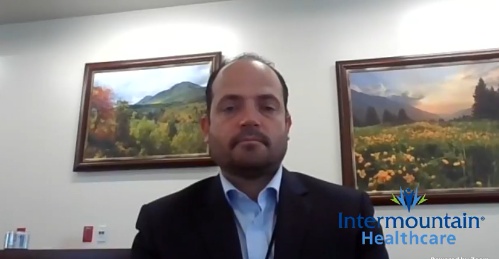COVID surge causes delays in local hospitals

Image supplied, Intermountain Healthcare
Intermountain Utah Valley Hospital surgeon Adam Bergeson speaking during a virtual news conference Friday, Oct. 22, 2021, about the COVID-19 situation.Hospitals across the state are still experiencing high patient volumes due to the state’s COVID-19 surge, and some patients without the virus are having to wait for important procedures.
At Intermountain Utah Valley Hospital in Provo, Dr. Adam Bergeson, an orthopedic surgeon and medical director of surgical services, said that last week, a patient with a brain tumor had to wait a day or two for surgery until an ICU bed became available.
Intermountain St. George Regional Hospital had a heart patient die waiting for a life-saving procedure. Another patient with an acute herniation and drop foot is still waiting for surgery, said Dr. Edward Prince, an orthopedic surgeon and medical director of surgical services at St. George Regional.
“Cardiovascular surgery usually requires an ICU stay, things like heart valve replacements and bypass surgery. You can live OK for awhile with an 80% occlusion but the longer you wait, the higher your risk is of having a stroke,” Prince said. “When you start to delay some of these procedures, you start to see significant adverse problems that now become urgent cases.”
Prince said patients who used to stay in the hospital for two to three days to recover are now being sent home the same day they had surgery.
“The data is pretty clear that the majority of patients coming to the hospital are unvaccinated patients. I think there’s a lot of political stuff going on and everyone has their own choice make their own decision, so number one, make your own decision for what is good for you, but number two, start to think about the community as a whole. Think about your grandmother or your relative who might need one of these procedures but can’t get it because of your negative opinion about the vaccine. Just get it.”
Dr. Eddie Stenehjem, Intermountain Healthcare infectious diseases physician, said the data is clear that the vaccines are safe and effective and people should strongly consider getting the shot.
“We are in a very different time right now compared to where we were last March and April where there were a handful of studies on the vaccines and our experience wasn’t significant,” he said. “Fast forward to now where we can say the vaccines have been so heavily studied. We know the safety profile and we can feel very comfortable being able to talk about side effects and rare adverse events in the first two months. We can absolutely stand behind these and say this is a safe vaccine that prevents death and keeps communities and hospitals safe.”
Stenehjem said he is not seeing the rapid drop off of COVID-19 he had hoped to see. However, he is hopeful the state will see a better winter due to natural immunity and vaccination rates.
“Right now I think we’re in a period of stability where our hospitals are completely full, our ICUs are at max capacity, and we’re still seeing very significant numbers of cases of COVID throughout our hospitals,” he said. “The majority of hospitalized patients are unvaccinated, between 80 and 90% and another 20% are vaccinated but have comorbidities.”
Stenehjem also said it’s important for eligible people to get their booster shots as soon as possible. If you are six months out from your primary series, you can get the Pfizer or Moderna booster if you are 65 and older, 18 to 65 with complicated medical conditions or you work in a high-risk environment. If you got the Johnson & Johnson vaccine, you only have to wait two months to get the booster. You can also now mix and match vaccines according to the CDC, but Stenehjem said if possible, he recommends getting the booster from the same pharmaceutical company you got your original shots.
As the holiday season approaches, all three physicians agreed it’s important to continue taking safety measures. For instance, if you have a family gathering and some members are not vaccinated, you can ask them not to attend — which is the extreme case — or ask that they have a negative test done 48 hours prior to the event.
“You have to think about the risk of potential transmission,” Stenehjem said. “If anybody is symptomatic, they should not be joining the family gathering.”



